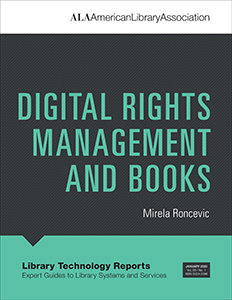Primary tabs
You don't need to be an ALA Member to purchase from the ALA Store, but you'll be asked to create an online account/profile during checkout to proceed. This Web Account is for both Members and non-Members. Note that your ALA Member discount will be applied at the final step of the checkout process.
If you are Tax-Exempt, please verify that your account is currently set up as exempt before placing your order, as our new fulfillment center will need current documentation. Learn how to verify here.
- Description
- Table of Contents
- About the authors
Digital rights management. Anyone who has in any way dealt with digital content in the past two decades has come across this term. It is talked about and written about in the context of all content disseminated digitally—books, films, music, and video games. It is the topic at every library and digital publishing conference and the subject of countless scholarly articles dedicated to trying to understand its impact. This issue of Library Technology Reports (vol. 56, no. 1), “Digital Rights Management and Books,” discusses digital rights management (DRM) in the context of books—popular and academic—and all who are part of the publishing ecosystem, including authors, readers, publishers, educators, researchers, librarians, and information scientists. Its aim is to provide a thorough analysis of what DRM is, what its main purpose is, what its legal implications are, who it affects, how it works, why it matters, why some believe it has done more harm than good for books and authors as well as libraries, what its challenges remain to this day, what may be possible solutions to those challenges, and what the future holds for DRM, including both those who support it (usually publishers) and those who vehemently oppose it (usually readers and librarians). Lastly, this report points to new ways in which DRM can be approached in the future and ways in which piracy and illegal online activities can be overcome more successfully.
Chapter 1: Introduction
- Definition of DRM
- How DRM Works
- Benefits and Drawbacks
- Notes
Chapter 2: DRM and the Law
- DRM Is Not Copyright
- Key Legislation
- Notes
Chapter 3: DRM and Consumers
- Early Frustrations
- Effects of Piracy
- Author Viewpoints
- No Easy Solution
- Notes
Chapter 4: DRM and Libraries
- Library Challenges
- The Role of Open Access
- Notes
Chapter 5: Lessons Learned
- Additional Resources
- Notes
Mirela Roncevic
Mirela Roncevic has served as a consultant for a range of publishers and libraries and partnered with companies creating new digital opportunities for publishers, authors, readers, educators, and librarians. She has also contributed articles, reports, book reviews, and short stories to numerous magazines and has served as managing editor of several book series and journals. Editorial Director of No Shelf Required, an award-winning portal on e-books and digital content, she is also the founder of the One Country, One Library initiative, which supports the creation of national libraries that provide free access to books and other content to all people inside a country’s borders for the purpose of bridging digital divides, equalizing access to education, enabling reading, and spreading literacy.
Library Technology Reports
Published by ALA TechSource, Library Technology Reports helps librarians make informed decisions about technology products and projects. Library Technology Reports publishes eight issues annually and provides thorough overviews of current technology. Reports are authored by experts in the field and may address the application of technology to library services, offer evaluative descriptions of specific products or product classes, or cover emerging technology. Find out more information on this publication and how you can subscribe here.



